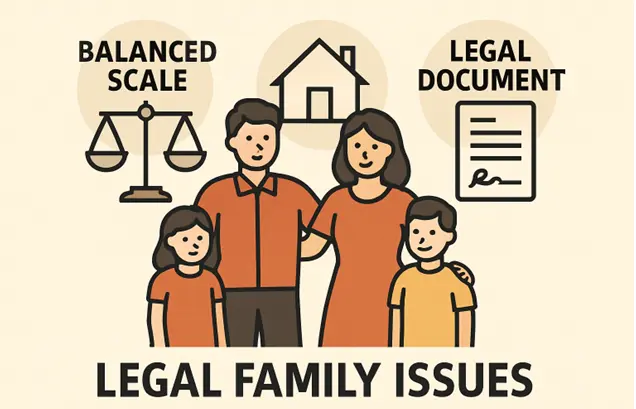Introduction
Families often encounter complex legal challenges that impact their stability, relationships, and future planning. In today’s dynamic legal environment, knowing where to turn for help is crucial. Legal experts can provide expert guidance for families navigating issues ranging from child custody disputes to property divisions during divorce. Understanding these challenges and how the law addresses them empowers families to make informed, thoughtful decisions about their well-being.
Contemporary family law is complex, covering custody, divorce, estate planning, domestic violence, and issues related to technology’s role in evidence and privacy. Legal experts are prepared to navigate these changing issues, providing families with the assistance necessary to safeguard their rights and confidently plan ahead. Click here https://www.thetxattorneys.com/ to discover more about family legal challenges.
Key Takeaways
- Child custody disputes often hinge on factors such as parental fitness, the child’s wishes, and co-parent communication.
- Proper estate planning helps prevent inheritance battles and ensures clear asset distribution.
- Victims of domestic violence must be aware of available legal protections and support systems.
- Property and asset divisions during divorce require clear legal guidance to ensure fairness.
- Technology plays a growing role in legal cases, especially regarding digital evidence and privacy issues.
Child Custody and Support Issues
Child custody and support remain among the most significant legal challenges families face. When parents separate or divorce, determining the best arrangement for their children’s upbringing is a top priority. Custody battles can be emotionally charged and are typically categorized as either legal or physical custody:
- Legal Custody: This grants a parent the authority to make major decisions about the child’s healthcare, education, and religious upbringing.
- Physical Custody: Physical custody determines where and with whom the child will live.
Family courts emphasize the child’s best interests, weighing factors such as parental fitness, the child’s age and preferences, and each parent’s ability to provide a stable environment. Child support calculations are influenced by the parents’ income, the child’s needs, and custody arrangements. Disputes commonly arise when parents cannot agree, often requiring mediation or court intervention to develop workable solutions. Open, respectful communication between co-parents remains vital to minimizing trauma for children and fostering a cooperative parenting environment.
Estate Planning and Inheritance Disputes
Estate planning is essential for families who want to avoid conflict after the death of a loved one and ensure assets are distributed as intended. Inheritance disputes commonly arise due to unequal distribution, unclear will instructions, or the exclusion of non-biological children and stepchildren, particularly in blended families. Issues may include:
- Unequal Inheritance: Disproportionate asset distribution often leads to claims of favoritism and challenges to the will’s validity.
- Contest of Will Validity: Wills created under questionable circumstances or with impaired mental capacity can spark litigation over their legitimacy.
- Omissions of Step– or Adopted Children: Without clear documentation, children may be excluded from inheritance, resulting in lengthy court battles.
To prevent such disputes, it’s crucial to have comprehensive, legally sound estate planning documents and open communication with family members about intentions. Consulting with an experienced estate attorney is advisable, particularly for families with complex relationships or significant assets.
Domestic Violence and Legal Protections
Domestic violence continues to be a significant concern affecting countless families. Legal protections—including restraining orders, emergency custody of children, and access to support services—are vital for the safety of victims. Those experiencing abuse should seek immediate help, as law enforcement and the legal system provide powerful resources to protect victims and their children. Shelters, counseling services, and advocate hotlines further assist in enhancing safety and long-term well-being.
Understanding the legal pathways available can be life-changing for victims facing threats or harm at home. Individuals in these situations should not hesitate to access community resources and legal professionals dedicated to family and survivor support.
Property Disputes in Divorce
One of the most contentious aspects of divorce is the division of marital assets. The process can become especially complicated when determining the ownership of property acquired during the marriage. States generally follow two approaches to property division:
- Community Property States: All property earned or acquired during the marriage is considered jointly owned and typically divided equally.
- Common Law States: Property is distributed according to ownership records and each spouse’s financial contributions, which does not always result in an equal split.
Disputes often arise over what counts as marital versus separate property, the valuation of joint assets, and how debts are handled. Thorough documentation and the guidance of a knowledgeable divorce attorney are critical for ensuring a fair and legally compliant settlement. Expert mediation can also help spouses resolve disputes amicably and avoid lengthy court proceedings.
Impact of Technology on Family Law
Rapid technological change has added new layers of complexity to family law cases. Electronic communication—including social media posts, emails, and text messages—is often used as evidence in divorce, custody, and abuse cases. Courts frequently scrutinize digital footprints to assess parental fitness, behavior patterns, and adherence to custody agreements. This evidence can support or undermine claims and dramatically influence case outcomes.
It is essential for individuals engaged in legal disputes to be mindful of their online presence and communications, as seemingly private information may become legally relevant. Additionally, family law professionals are adapting to evolving privacy laws and data management requirements, making it necessary for families to stay informed about current legal standards.
Addressing these common legal challenges with competent legal guidance and proactive communication can empower families to safeguard their interests and create secure, positive futures, even in the face of adversity.
Also Read-Data Science Innovations Transforming the Fintech Landscape








